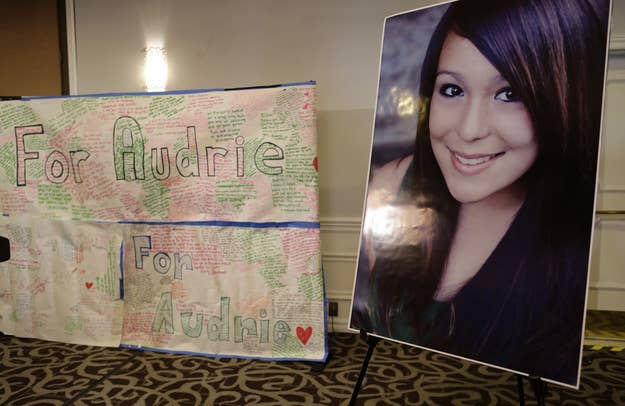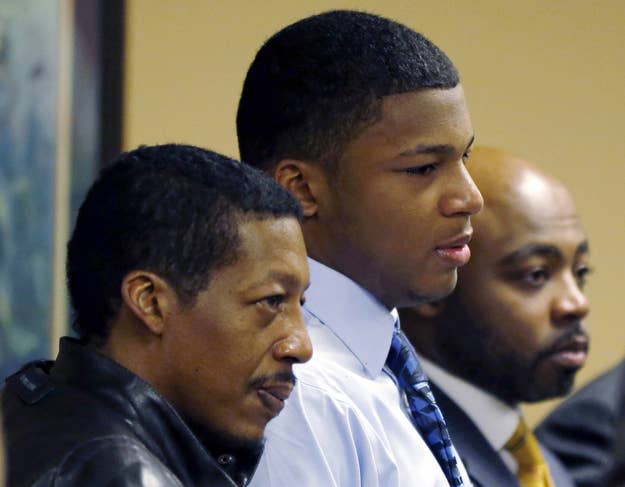
Back in September, fifteen-year-old Audrie Pott took her own life after she was allegedly sexually assaulted while passed out at a party. According to her family's attorney, Pott "had no idea what occurred until she woke up the following morning and had some drawings on her body and in some private areas." Allegedly, one of her attackers wrote "I was here" on her breasts in black marker. Right before her death, Pott posted on Facebook: "I can't do anything to fix it. I just want this to go away. The whole school knows. My life is ruined and I don't even remember how."
Pott's story is eerily similar to the Steubenville rape earlier this year, where teenagers Trent Mays and Ma'lik Richmond were sentenced to juvenile detention after being found guilty of the rape of a classmate.
Most would probably agree that if found guilty, Pott's attackers, along with Mays and Richmond, deserve to be punished for their crimes. But while everyone wants rapists to face justice, not everyone agrees that our current system of punishment is just. Some argue that it isn't prison sentences that sexual attackers need, but sympathy, compassion and a chance at real healing. They propose what they call transformative justice as a better way to deal with sexual offenders and violent criminals — and some say it might even be more effective at curbing crime than more traditional methods.
Americans are the most jailed population in the wealthy world; despite having less than 5 percent on the world's population, the United States has almost a quarter of the world's prisoners. At the federal level, Black offenders receive sentences that are 10 percent longer than white offenders for the same crimes. African American youth have higher rates of juvenile incarceration and are more likely to be sentenced to adult prison.
And many criminologists believe that punitive criminal justice systems do not work at preventing crime. A 2007 study commissioned by the JFA institute, a nonprofit dedicated to evaluating the country's criminal justice practices, concluded that imprisonment has almost no impact on crime rates. The study authors wrote that our "justice system practices exacerbate the crime problem, unnecessarily damage the lives of millions of people, waste tens of billions of dollars each year, and create less than ideal social and economic conditions in many sections of our largest American cities."
For some, transformative justice offers a solution. According to anti-child abuse organization Generation Five, transformative justice is a model of dealing with violence that "puts transformation and liberation at the heart of the change. It is an approach that looks at the individual and community experiences as well as the social conditions." Rather than relying solely on the established criminal justice system, Generation Five recommends communities form their own groups to develop individualized plans for abusers to follow — these may include punishments like "public exposure of the person who is abusive, the removal of relationships that they care about, or telling their employer," but they're also aimed at rehabilitating the violent person if possible and allowing him or her to make amends. The collectives may also work with bystanders and community institutions to help make any future abuse or violence less likely.

Ebony Brown, Trauma Practitioner and Researcher for the Bay Area Transformative Justice Collective, told BuzzFeed that transformative justice tries to do more than just punish or "deal with" the perpetrators of violence: "Transformative justice is not just a method of handling violence, but is a shift in consciousness, which says we hold those who do the violence AND the social conditions that produce the violence accountable. In that way transformative justice says we not only address the immediate harm, but also the social conditions that allow for harm to take place."
And while traditional criminal punishment focuses on the individual crimes of individual lawbreakers, transformative justice takes a broader approach that tries to prevent future violence. For Brown, transformative justice is about dealing with the impacts of violence on communities and going from there. "With transformative justice you go from looking at one act of violence to looking how violence is reinforced in communities," Brown says. "The current ways we address violence stops at the personal experience of the survivor and the personal accountability of those who do violence. It just isn't enough to prevent future violence."
According to Brown, another key difference between transformative justice and the traditional criminal justice system is the idea of blame; the traditional criminal justice system asks, "who is at fault," meanwhile transformative justice asks, "Why would this happen in this community? How do we prevent this?"
Writer and prison abolitionist Mia McKenzie, who's written about transformative justice in the context of the Steubenville rapists, says transformative justice might actually be more effective than the traditional variety: "Even if someone doesn't care about prison abolition from a human rights standpoint, the simple fact is that the system of incarceration is ineffective. Our society is not less violent because we put people who commit crimes in prison. That's just the plain truth. So if you are someone who cares about ending violence, and in particular violence against women, then at the very least you should want a system that works and that is effective in doing that. And since it should be clear to everyone that this system doesn't work, we should all be interested in alternatives."
Asked whether she thinks the traditional criminal justice system or transformative justice would be a useful tool in the case of the Steubenville rapists, Brown points out that the traditional criminal justice system will likely not do much in the way of putting a stop to rapes and sexualized violence in the Steubenville community either. "Is the sentencing of two boys going to stop future rapes in the community? Probably not, because young boys have been being sentenced to rape for decades, and it didn't stop this one," she argues.
In the case of the Steubenville rapists, the crimes were so heinous that it's difficult to not want to see the perpetrators behind bars. But both Brown and the transformative justice movement urge individuals to look beyond criminal and victim and think about the people in the communities that deal with violence. "What are those young men learning from the sentencing, what are the bystanders learning, and what is the survivor learning? Does she feel empowered? Do her peers feel like they can take collective action to continue make themselves more safe and reduce violence? These are all of the questions left out of the criminal legal system, and the questions when answered will produce lasting change," Brown reminds.
Some research supports her point of view. According to the Washington State Institute for Public Policy, sex offenders who received alternative sentencing that includes outpatient treatment and supervision are less likely to return to sexual violence than those who are sentenced to traditional jail time.

While this may sound promising, not everyone is convinced that transformative justice is the best way to deal with the aftermath of rape. Some worry that transformative justice models can often emphasize the needs of the offender rather than the needs of the victim.
Even while she acknowledges that non-traditional justice models might offer victims some comfort, Susan Herman, executive director for the National Center for Victims of Crime, maintains the traditional criminal justice system ultimately offers victims a better chance at repairing the harm caused by crime. She argues, "From a victim's point of view, then, it is disappointing that a new paradigm that uses the word 'restorative' does not address critical crime-related needs. Harm caused by an offender in a moment can change a life forever. Reparation can have very little to do with an ongoing relationship with an offender or a community."
And Scott Berkowitz, founder and president of the Rape Abuse and Incest National Network, says that given the seriousness of rape, a "long jail sentence is always appropriate." Berkowitz told me, "Victims are looking for justice. For a crime this serious justice includes punishment."
Transformative justice hasn't quite entered the mainstream, yet. But the questions it raises are ones our country needs to wrestle with: Can we balance rehabilitating perpetrators with advocating for victims of rape and sexual assault? Can we demand justice for sexual attackers while also fighting oppression in our criminal justice system? And in a society rife with inequality, what does it mean to be just?
